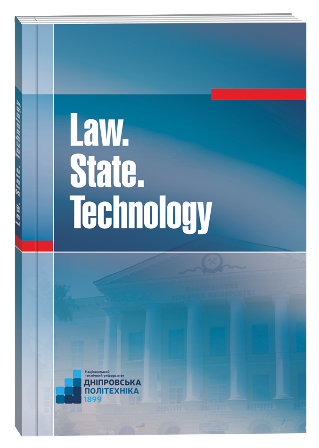THE RIGHT TO ENVIRONMENTAL SAFETY IN THE FORMATION OF THE CONTENT OF REGIONAL ENVIRONMENTAL POLICY
DOI:
https://doi.org/10.32782/LST/2023-3-4Keywords:
environmental education, environmental education, environmental tax, the right to a safe environment, regional environmental policyAbstract
The purpose of the scientific article is to determine the content of the subjective right to a safe environment in the context of shaping the content of regional environmental policy. It has been determined that at the international level, the issue of implementation of environmental rights of individuals is enshrined in the Aarhus Convention, which defines the following key principles: 1) access to information; 2) public participation; 3) access to justice. It has been established that an important component of regional environmental policy is environmental policy, which functionally fulfills the goal of creating a financial incentive to reduce negative impacts on the environment, promote the conservation of natural resources and promote the transition to more sustainable and environmentally friendly production and consumption. The components of regional environmental policy also include the creation of conditions for greening production and supporting the eco-industry. It is emphasized that the implementation of regional environmental policy should be based on the decentralization of financing of environmental activities, ensuring the effectiveness of the formation of environmental education and environmental legal awareness, attracting foreign investment to green production and build an economy based on recycling of consumer products and waste management. Of great importance in ensuring the right to a safe environment is the creation of conditions for the effective implementation of state and regional environmental policy. It has been established that the organization of the environmental education system in Ukraine includes both formal and informal teaching methods and plays an important role in the formation of environmental consciousness and culture among the younger generation. It is emphasized that the main aspects of organizing environmental education include: 1) formal environmental education; 2) non-formal environmental education. The system of formal environmental education activities includes training in official educational institutions, such as preschool, secondary schools, vocational and higher education institutions.
References
Барліт А.Ю. Адміністративно-правові засади реалізації суб’єктивних публічних екологічних прав. Юридичний бюлетень. 2020. № 14. С. 145–152.
Діхтієвський В.П. Нормативно-правові засади доступу до інформації про стан використання природних ресурсів. Юридичний науковий електронний журнал. 2020. № 4. C. 19-24.
Кадникова Г.В. Правове регулювання режиму доступу до публічної інформації. Актуальні проблеми вітчизняної юриспруденції. 2018. № 4. С. 116–121.
Кучма К. С. Правова основа надання адміністративних послуг у сфері екології та природних ресурсів. Юридичний науковий електронний журнал. 2016. № 3. С. 92–95
Легеза Ю.О. Оптимізація системи публічного управління у сфері використання та охорони природних ресурсів (на підставі авторського соціологічного опитування). Науковий вісник Херсонського державного університету. 2022. Випуск 1. С. 20-25. URL: https://doi.org/10.32999/ksu2307-8049/2022-1-4
Mishyna N. V. Decentralization: European court of human rights’ judgements implementation. Наукові праці Національного університету «Одеська юридична академія». Одеса, 2023. Т. 32. С. 94-99. http://naukovipraci.nuoua.od.ua/arhiv/tom32/11.pdf
Шемшученко Ю. С., Погорілко В. Ф. Адміністративно-правова охорона природи Української РСР. Київ: Наук. думка, 1973. 128 с.
Конвенція про доступ до інформації, участь громадськості в процесі прийняття рішень та доступ до правосуддя з питань, що стосуються довкілля (Орхуська конвенція): міжнародний документ ООН від 25 червня 1998 р. (ратифікований Законом України від 6 липня 1999 р. № 832-XIV). Верховна Рада України. Офіційний вісник України. 2010. № 33. C. 12. Ст. 1191. URL: https://zakon.rada.gov.ua/laws/show/994_015
Балюк Г. Вплив міжнародного досвіду на вирішення проблем судового захисту екологічних прав громадян в Україні. Міжнародний судовий форум: «Судовий захист природного довкілля та екологічних прав» (м. Київ, 7 листопада 2019 року): Збірник матеріалів. Київ, 2019. С. 172-178.
Резолюція Генеральної Асамблеї ООН № 70/1 від 25 вересня 2015 року «Перетворення нашого світу. Порядок денний у сфері сталого розвитку на період до 2030 року». URL: http://sdg.org.ua/ua/resources-2/344-2030-2015
Про Цілі сталого розвитку України на період до 2030 року : Указ Президента України № 722/2019 від 30 жовтня 2019 року.Офіційний вісник Президента України. 2019. № 21. Cт. 890.
Захист права на інформацію в Україні : зб. тез доп. міжнарод. конф. (м. Львів, 20– 21 грудня 2007 р.) / Олена Кравченко (ред.). Львів : МБО «Екологія-Право-Людина», 2008. 56 с.
Концепція екологічної освіти України. Інформаційний збірник Міністерства освіти і науки України. 2002. №7. С. 3-23.
Про Основні засади (стратегію) державної екологічної політики України на період до 2030 року: Закон України від 28 лютого 2019 року № 2697-VIII. URL: https://zakon.rada.gov.ua/laws/show/2697-19#Text








